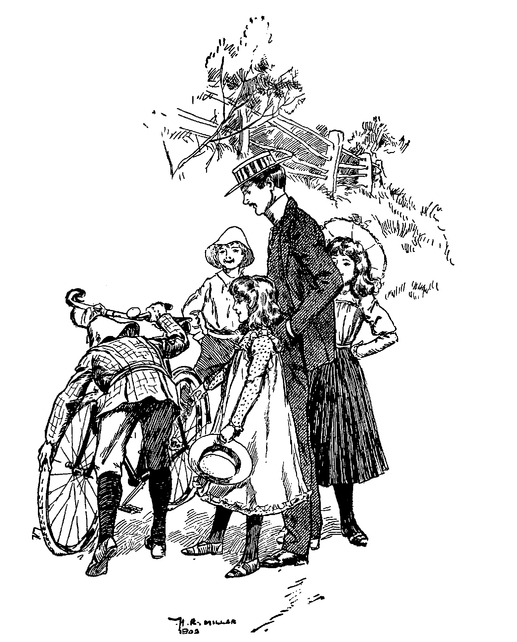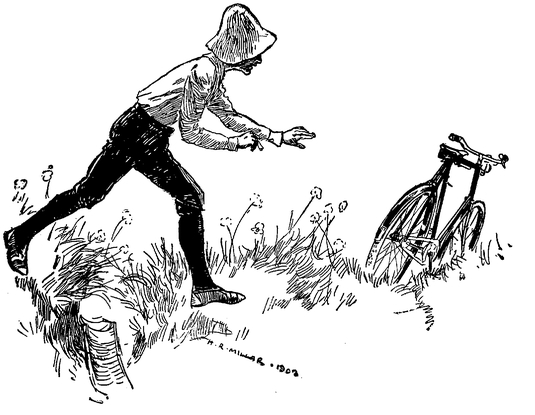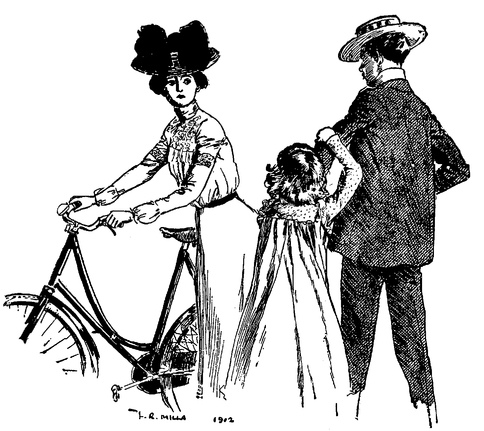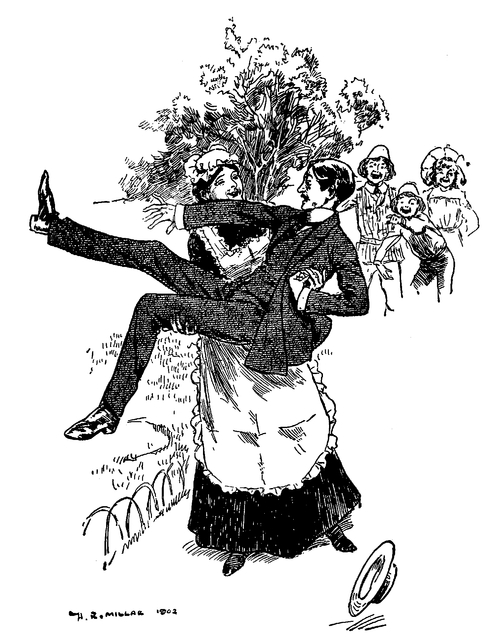Enchanted Castle and Five Children and It (Barnes & Noble Classics Series) (25 page)
Read Enchanted Castle and Five Children and It (Barnes & Noble Classics Series) Online
Authors: Edith Nesbit

BOOK: Enchanted Castle and Five Children and It (Barnes & Noble Classics Series)
8.05Mb size Format: txt, pdf, ePub
But the almost daily adventures resulting from the Psammead wishes were making the children wise beyond their years.
“Dear Hilary,” said Anthea, and the others choked at the name, “you know father didn’t wish you to go to London. He wouldn’t like us to be left alone without you to take care of us. Oh, deceitful beast that I am!” she added to herself.
“Look here,” said Cyril, “if you’re our elder brother, why not behave as such and take us over to Maidstone and give us a jolly good blow-out, and we’ll go on the river afterwards?”
“I’m infinitely obliged to you,” said the Lamb courteously, “but I should prefer solitude. Go home to your lunch—I mean your dinner. Perhaps I may look in about tea-time—or I may not be home till after you are in your beds.”
Their beds! Speaking glances flashed between the wretched four. Much bed there would be for them if they went home without the Lamb.
“We promised mother not to lose sight of you if we took you out,” Jane said before the others could stop her.
“Look here, Jane,” said the grown-up Lamb, putting his hands in his pockets and looking down at her, “little girls should be seen and not heard.You kids must learn not to make yourselves a nuisance. Run along home now—and perhaps, if you’re good, I’ll give you each a penny tomorrow.”
“Look here,” said Cyril, in the best “man to man” tone at his command, “where are you going, old man? You might let Bobs and me come with you—even if you don’t want the girls.”
“You kids must learn not to make yourselves a nuisance”

This was really rather noble of Cyril, for he never did care much about being seen in public with the Lamb, who of course after sunset would be a baby again.
The “man to man” tone succeeded.
“I shall just run over to Maidstone on my bike,” said the new Lamb airily, fingering the little black moustache. “I can lunch at The Crown—and perhaps I’ll have a pull on the river; but I can’t take you all on the machine—now, can I? Run along home, like good children.”
There, sure enough, stood a bicycle

The position was desperate. Robert exchanged a despairing look with Cyril. Anthea detached a pin from her waistband, a pin whose withdrawal left a gaping chasm between skirt and bodice, and handed it furtively to Robert—with a grimace of the darkest and deepest meaning. Robert slipped away to the road. There, sure enough, stood a bicycle—a beautiful new free-wheel. Of course Robert understood at once that if the Lamb was grown up he must have a bicycle. This had always been one of Robert’s own reasons for wishing to be grown up. He hastily began to use the pin—eleven punctures in the back tyre, seven in the front. He would have made the total twenty-two but for the rustling of the yellow hazel-leaves, which warned him of the approach of the others. He hastily leaned a hand on each wheel, and was rewarded by the “whish” of what was left of the air escaping from eighteen neat pin-holes.
“Your bike’s run down,” said Robert, wondering how he could so soon have learned to deceive.
“So it is,” said Cyril.
“It’s a puncture,” said Anthea, stooping down, and standing up again with a thorn which she had got ready for the purpose. “Look here.”
The grown-up Lamb (or Hilary, as I suppose one must now call him) fixed his pump and blew up the tyre. The punctured state of it was soon evident.
“I suppose there’s a cottage somewhere near—where one could get a pail of water?” said the Lamb.
There was; and when the number of punctures had been made manifest, it was felt to be a special blessing that the cottage provided “teas for cyclists.” It provided an odd sort of tea-and-hammy meal for the Lamb and his brothers. This was paid for out of the fifteen shillings which had been earned by Robert when he was a giant—for the Lamb, it appeared, had unfortunately no money about him. This was a great disappointment for the others; but it is a thing that will happen, even to the most grown-up of us. However, Robert had enough to eat, and that was something. Quietly but persistently the miserable four took it in turns to try to persuade the Lamb (or St. Maur) to spend the rest of the day in the woods. There was not very much of the day left by the time he had mended the eighteenth puncture. He looked up from the completed work with a sigh of relief, and suddenly put his tie straight.
“There’s a lady coming,” he said briskly—“for goodness’ sake, get out of the way. Go home—hide—vanish somehow! I can’t be seen with a pack of dirty kids.” His brothers and sisters were indeed rather dirty, because, earlier in the day, the Lamb, in his infant state, had sprinkled a good deal of garden soil over them. The grown-up Lamb’s voice was so tyrant-like, as Jane said afterwards, that they actually retreated to the back garden, and left him with his little moustache and his flannel suit to meet alone the young lady, who now came up the front garden wheeling a bicycle.
The woman of the house came out, and the young lady spoke to her—the Lamb raised his hat as she passed him—and the children could not hear what she said, though they were craning round the corner by the pig-pail and listening with all their ears. They felt it to be “perfectly fair,” as Robert said, “with that wretched Lamb in that condition.”
When the Lamb spoke in a languid voice heavy with politeness, they heard well enough.
“A puncture?” he was saying. “Can I not be of any assistance? If you could allow me—?”
There was a stifled explosion of laughter behind the pig-pail-the grown-up Lamb (otherwise Devereux) turned the tail of an angry eye in its direction.
“You’re very kind,” said the lady, looking at the Lamb. She looked rather shy, but, as the boys put it, there didn’t seem to be any nonsense about her.
“But oh,” whispered Cyril behind the pig-pail, “I should have thought he’d had enough bicycle-mending for one day—and if she only knew that really and truly he’s only a whiny-piny, silly little baby!”
“He’s not,” Anthea murmured angrily. “He’s a dear—if people only let him alone. It’s our own precious Lamb still, whatever silly idiots may turn him into—isn’t he, Pussy?”
Jane doubtfully supposed so.
Now, the Lamb—whom I must try to remember to call St. Maur—was examining the lady’s bicycle and talking to her with a very grown-up manner indeed. No one could possibly have supposed, to see and hear him, that only that very morning he had been a chubby child of two years breaking other people’s Waterbury watches. Devereux (as he ought to be called for the future) took out a gold watch when he had mended the lady’s bicycle, and all the onlookers behind the pig-pail said “Oh!”—because it seemed so unfair that the Baby, who had only that morning destroyed two cheap but honest watches, should now, in the grown-upness Cyril’s folly had raised him to, have a real gold watch—with a chain and seals!
Hilary (as I will now term him) withered his brothers and sisters with a glance, and then said to the lady—with whom he seemed to be quite friendly:
“If you will allow me, I will ride with you as far as the Cross Roads; it is getting late, and there are tramps about.”
No one will ever know what answer the young lady intended to give to this gallant offer, for, directly Anthea heard it made, she rushed out, knocking against the pig-pail, which overflowed in a turbid stream, and caught the Lamb (I suppose I ought to say Hilary) by the arm. The others followed, and in an instant the four dirty children were visible, beyond disguise.
“Don’t let him,” said
Anthea;
“he’s not fit to go with anyone”
Anthea;
“he’s not fit to go with anyone”

“Don’t let him,” said Anthea to the lady, and she spoke with intense earnestness; “he’s not fit to go with anyone!”
“Go away, little girl!” said St. Maur (as we will now call him) in a terrible voice. “Go home at once!”
“You’d much better not have anything to do with him,” the now reckless Anthea went on. “He doesn’t know who he is. He’s something very different from what you think he is.”
“What do you mean?” asked the lady not unnaturally, while Devereux (as I must term the grown-up Lamb) tried vainly to push Anthea away. The others backed her up, and she stood solid as a rock.
“You just let him go with you,” said Anthea, “you’ll soon see what I mean! How would you like to suddenly see a poor little helpless baby spinning along downhill beside you with its feet up on a bicycle it had lost control of?”
The lady had turned rather pale.
“Who are these very dirty children?” she asked the grown-up Lamb (sometimes called St. Maur in these pages).
“I don’t know,” he lied miserably.
“Oh, Lamb! how can you?” cried Jane—“when you know perfectly well you’re our own little baby brother that we’re so fond of We’re his big brothers and sisters,” she explained, turning to the lady, who with trembling hands was now turning her bicycle towards the gate, “and we’ve got to take care of him. And we must get him home before sunset, or I don’t know whatever will become of us. You see, he’s sort of under a spell—enchanted—you know what I mean!”
Again and again the Lamb (Devereux, I mean) had tried to stop Jane’s eloquence, but Robert and Cyril held him, one by each leg, and no proper explanation was possible. The lady rode hastily away, and electrified her relatives at dinner by telling them of her escape from a family of dangerous lunatics. “The little girl’s eyes were simply those of a maniac. I can’t think how she came to be at large,” she said.
When her bicycle had whizzed away down the road, Cyril spoke gravely.
“Hilary, old chap,” he said, “you must have had a sunstroke or something. And the things you’ve been saying to that lady! Why, if we were to tell you the things you’ve said when you are yourself again, say tomorrow morning, you wouldn’t even understand them—let alone believe them! You trust to me, old chap, and come home now, and if you’re not yourself in the morning we’ll ask the milkman to ask the doctor to come.”
The poor grown-up Lamb (St. Maur was really one of his Christian names) seemed now too bewildered to resist.
“Since you seem all to be as mad as the whole worshipful company of hatters,” he said bitterly, “I suppose I had better take you home. But you’re not to suppose I shall pass this over. I shall have something to say to you all tomorrow morning.”
“Yes, you will, my Lamb,” said Anthea under her breath, “but it won’t be at all the sort of thing you think it’s going to be.”
In her heart she could hear the pretty, soft little loving voice of the baby Lamb—so different from the affected tones of the dreadful grown-up Lamb (one of whose names was Devereux)—saying, “Me love Panty—wants to come to own Panty.”
“Oh, let’s get home, for goodness’ sake,” she said. “You shall say whatever you like in the morning—if you can,” she added in a whisper.
The grown-up Lamb struggled furiously

Other books
Family of Lies by Mary Monroe
The Big Shuffle by Laura Pedersen
The Orchardist by Amanda Coplin
Queen’s Knight (Invitation to Eden) by Sara Fawkes
The Chocolate Lovers' Club by Matthews, Carole
The Gentlemen's Club: Volume One in the 'Noire' series by de Maupassant, Emmanuelle
To Love a Thief (Steel Hawk) by Jane Beckenham
Acceptance: A Novel (The Southern Reach Trilogy) by Jeff VanderMeer
A Virgin Bride by Barbara Cartland
Emily's Ghost by Stockenberg, Antoinette